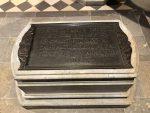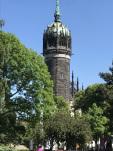This is the text of my Presidential Address to the Leeds Diocesan Synod this morning. (Disclaimer: I wrote it last night at Berlin Tegel and Amsterdam Schipol airports on my way home from an academic conference in Wittenberg, Germany.)
I returned late last night from Wittenberg in Germany. I was there to present a paper at a conference on Faith, Theology and the Church (from Tuesday to Thursday) and then record a programme for BBC Radio 4 on Martin Luther and the Reformation. Having launched the Reformation jubilee last October, preaching in the Augustinerklosterkirche in Erfurt where Luther was a monk, it was a privilege to end the year in Wittenberg where it all kicked off. As everyone knows, 31 October 2017 is the 500th anniversary of the day when Luther is alleged to have nailed his 95 Theses to the door of the Schloßkirche, thus challenging the Pope and the Church to address some serious concerns about both theology and the practices of the church.
Many of the stories of Luther’s words and deeds are now of dubious provenance. There is no record of him having told the Emperor at the Diet of Worms: “here I stand; I can do no other”. (Which hasn’t deterred sock manufacturers from producing huge numbers of their products with the phrase added. I might bear the weight of one’s foot, but it doesn’t seem to bear the weight of history. In fact, there is no evidence that he did actually nail his 95 Theses to the church door – something impossible now because the doors are made of bronze.

Martin Luther’s tomb
But, why let facts get in the way of a good story. Whatever the details of who did what and when, we do know for certain that Luther took his life in his hands when he dared to suggest that the grace of God is there for everyone and cannot be bought – even in the good cause of building St Peter’s in Rome. Fear of the consequences of death were trounced by the mercy of God.
Sitting in the Schloßkirche yesterday morning, looking at Luther’s tomb, I was very conscious that we can’t always control the consequences of the decisions we make. The monk of Erfurt changed the world in ways he could never have imagined when he found Paul’s letter to the Romans opening his heart and mind to the riches of God’s unmerited love. Not only a revolution in the church, but political ructions, too, that too often led to bloodshed on a huge scale. I wonder what he would have made of it today, if he had known what he was about to unleash.
This is not insignificant for us here in the Diocese of Leeds. After giving my paper at the conference on Thursday, I took part in a panel discussion with the Roman Catholic Archbishop of Berlin and the head of the Protestant Church in Germany (the EKD),where both the divisions and affinities of ecumenical relationships were visible. As the church faces big challenges in British and wider European cultures, the need for Christians to prioritise their common baptismal discipleship over their denominational commitments becomes more urgent.
On of the watchwords of the Reformation traditions is ‘ecclesia semper reformanda’ – the Church needing constantly to be being renewed and reformed. Nothing stands still in this world. And the church can be no exception. Change is here to stay.
It would be ludicrously absurd to compare the changes our diocese has gone through in the last three and a half years with the enormity of the Reformation, but we need no telling that change brings pain as well as opening up new opportunities for those who are unafraid to explore them. And not every outcome can be predicted. As Luther found out – and it caused him a whole new set of griefs and concerns – there is the small matter of the Law of Unintended Consequences.
Our diocese continues to change as we move on from the initial phase of our creation from 2014 to 2016. We are now functioning as a single diocese with a single administration, and we are now clear about where we are in terms of shaping support for clergy and parishes as they ‘do’ our mission and ministry locally. But, this has all taken place at a time when the church across the country is facing a hefty drop in the number of stipendiary ordained people during the next fifteen years. This inevitably means that we will need to re-shape not only where we deploy our clergy, but the nature of the role, too. A priest cannot do in six parishes what he or she did in one. And we cannot put clergy into jobs that are not do-able.
In other words, we have a lot of work to do in the next few years. We do so in the face of financial challenges, too, but our primary focus has to be on what sort of ministry and mission we can provide within the constraints over which we do not have complete (or any) control. Now, is this a cause for fear or concern? Well, yes and no. We need to be concerned enough to tackle the challenges head on and pay attention to the detail – understanding the cost of growth as well as the benefits. But, we need not fear. We are engaged in God’s mission, and must never lose track of the bigger picture of God’s transforming grace, his call to keep moving – with him – and to be faithful to him and each other.

But, the primary calling of lay people is not to do stuff in and for the church, but to be disciples of Jesus Christ out there in the world. One of the recognised challenges of the church in more recent years has been that lay vocation has too often focused on lay ministries in the church – largely liturgical or pastoral. This is something we need to tackle as we move into the future. Discipleship first.
To this end we are holding a Lay Conference in Harrogate on Saturday 9 June 2018. More details will be forthcoming soon, but planning is well underway under the guidance of Andrew Norman and Hayley Matthews. This is intended to help us re-frame our strategy for lay discipleship and ministry into the future – although this will be a matter of process rather than event.
Nothing of what we do can be done in isolation. On today’s agenda this Synod will address several matters that, together, help us discipline our development and mission. Asking the General Synod to change the name of the See of Richmond to Kirkstall is not a whim or a bit of ecclesiastical fancy; no, it is to enable those outside the church in the Leeds Episcopal Area (particularly) to identify with the area bishop and our church structure. People assume Richmond is up north and can’t see why the Bishop of Richmond is bothered with the city of Leeds. For the sake of our ongoing mission we need to change this. More later, but I want at this point simply to locate this agenda item in our wider missional context.
A communications strategy for the diocese is not incidental. If we can’t communicate effectively in the world in which we now live, then we might as well just tend a long decline. We cannot address the lack of children and young people in our churches without engaging with social media and a way of relating/communicating that is a million miles away from what I grew up with. Do we have the courage to grasp this nettle and learn a new language of evangelism and pastoral care? That is the question – along with: are we willing to put resources into making effective communications and changing the rumor about God and the church?
Rules about synod elections and sizes of synods might not be the stuff of romance, but they matter. It is vital that our synods – at every level – should drive and enhance our mission … and for that we need people – in the right numbers and variety – who are caught up by a vision of the kingdom of God that grabs popular attention, awakens curiosity, draws people in from being met outside on their territory and in their terms. Are we up for this? It isn’t easy, and it will mean sacrifice; but, we need younger energy and vision to challenge us and drag us into new ways of being a renewed and reformed church in this part of Yorkshire.
Again, this is not for the sake of the church’s organisation or own well-being. Yorkshire faces massive challenges in the wake of Brexit (however that might ultimately look…), but also in terms of its own political organisation. Westminster seems to have a view of how Yorkshire might be governed in the future (under its devolution proposals), but how do we want to help drive this for the sake of the common good of the people of Yorkshire? Do we want to be stuck in the past, with old enmities and thinking within old white lines, or can we be bold about developing a vision of and strategy for a Yorkshire that makes the most of the Northern Powerhouse – whatever that means?
What I am driving at here is that we should not be a church that merely responds to the initiatives of others, but be creative ourselves at fostering debate and proposition that, rooted in our traditions, offers a refreshed view of future potential.
Of course, this is all stuff and nonsense if we would prefer to just keep turning the handle. In the diocese we have proved that, even where we might have differing degrees of affection for the diocese we have shaped, we can commit ourselves to it as mature adults who follow Jesus Christ.
At this point I want to pay special thanks to the Dean of Wakefield, Jonathan Greener, who will leave the diocese in November and be installed as Dean of Exeter. Jonathan vigorously opposed the creation of the new diocese, but, since its creation, has been an excellent friend and colleague, a creative and imaginative shaper of new things (three cathedrals and three deans in a single diocese), and a brave contributor to all we have done. We owe him a huge debt. Personally, I will miss him, his wisdom and advice, even his humor. But, we wish him God’s richest blessing and the fullness of the Spirit’s gifts as he and Pamela move into a not-unchallenging situation in Exeter. They go with our love, gratitude and prayers.
So, let me conclude where we began – with Martin Luther. While sitting with three young Germans in the very room in Luther’s house in Wittenberg, around the table where he and his friends argued about theology, politics, beer and bodily functions (I kid you not), having our own feisty debate about the meaning of Luther’s theology now, we felt close to the heart of passion: the passion that is courageous, contagious, irritating, maybe even hopeful – maybe even the passion for Jesus Christ, his grace and mercy, his call to us and his friends to love one another as he loves us.
